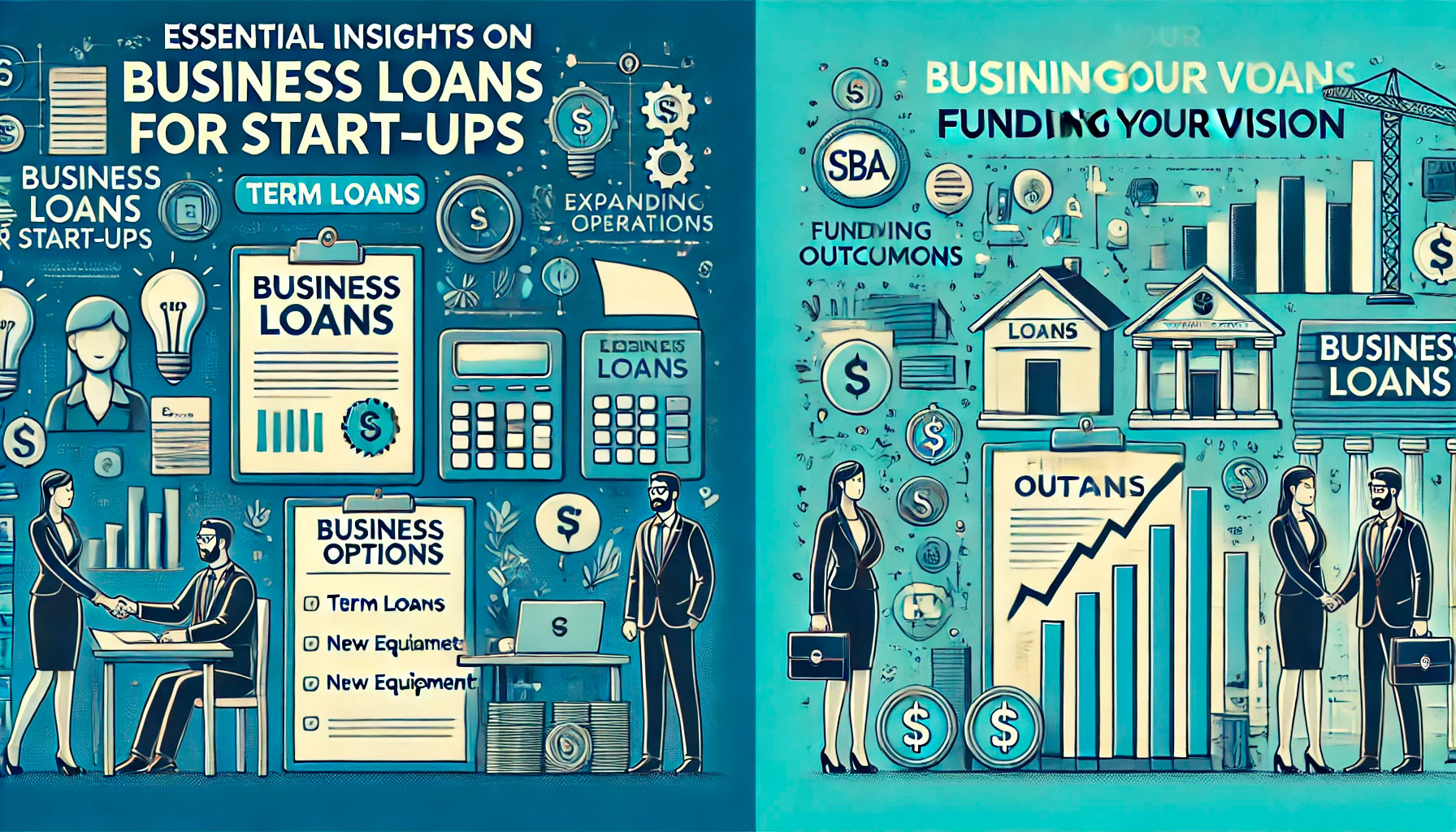Starting a business is an exciting venture, but it often requires significant financial resources. For many entrepreneurs, business loans are an essential tool for funding the initial costs of starting a company. Whether you’re looking to cover operational expenses, invest in equipment, or fund marketing efforts, understanding how business loans work for start-ups is critical. In this guide, we will explore the key factors that start-ups should consider when applying for business loans and how to make informed decisions about financing your new venture.
Why Business Loans Are Important for Start-Ups
Starting a business from scratch often involves substantial costs, from renting office space to purchasing inventory and hiring staff. Many entrepreneurs do not have enough capital saved to cover these costs, which is where business loans come into play. By providing access to funds, business loans allow start-ups to launch operations, scale, and grow without relying solely on personal savings.
In addition, a business loan can help you establish a credit profile for your new company. Building a solid business credit history early on can make it easier to secure additional financing in the future as your business expands.
Types of Business Loans Available for Start-Ups
1. Term Loans
A term loan is a common financing option for start-ups. These loans provide a lump sum of capital upfront, which is repaid over a fixed period with interest. Term loans are ideal for start-ups that need to make large purchases, such as buying equipment or leasing office space. The fixed repayment schedule allows businesses to plan their finances, making term loans predictable and manageable.
However, start-ups may find it difficult to qualify for traditional term loans if they lack a business credit history or sufficient collateral. Lenders often require personal guarantees, meaning the business owner’s personal assets could be at risk if the loan is not repaid.
2. SBA Loans
Small Business Administration (SBA) loans are a popular choice for start-ups because they offer favorable terms and lower interest rates than traditional loans. These loans are partially guaranteed by the government, reducing the risk for lenders and making it easier for start-ups to qualify. The SBA offers various loan programs, including microloans and 7(a) loans, which can be used for working capital, equipment, and even real estate.
However, the application process for SBA loans can be lengthy and requires detailed documentation, such as a business plan and financial projections. Start-ups must also demonstrate their ability to repay the loan, which can be challenging for businesses without a proven track record.
3. Business Lines of Credit
A business line of credit provides start-ups with flexible access to funds. Unlike a term loan, where you receive a lump sum upfront, a line of credit allows you to borrow only what you need, when you need it, up to a predetermined limit. This can be particularly useful for managing cash flow, covering unexpected expenses, or financing short-term needs.
Interest is only charged on the amount you borrow, making lines of credit more cost-effective than other loan types. However, securing a business line of credit can be difficult for start-ups, especially if they lack collateral or a strong credit history.

Key Factors Lenders Consider for Start-Up Loans
1. Personal Credit Score
For many start-ups, the business owner’s personal credit score plays a significant role in securing a loan. Since start-ups often don’t have an established business credit history, lenders look to the owner’s personal financial track record to assess their ability to manage debt. A strong personal credit score can increase your chances of loan approval and help you secure better terms.
If your credit score is less than ideal, consider working to improve it before applying for a loan. Paying down personal debt, making timely payments, and reducing credit card balances can help boost your credit score and improve your chances of qualifying for a loan.
2. Business Plan
Lenders want to see that you have a solid business plan in place before they approve a loan for your start-up. A well-structured business plan demonstrates that you have thought through your business idea, identified your target market, and outlined a strategy for generating revenue. It should include financial projections, including how you plan to use the loan funds and how you intend to repay the loan.
Having a comprehensive business plan not only increases your chances of loan approval but also helps you clarify your business goals and identify potential challenges in advance.
3. Collateral
Some lenders may require collateral to secure the loan, especially if the start-up lacks a business credit history. Collateral can be in the form of business assets, such as equipment or inventory, or personal assets, such as a home or vehicle. Providing collateral reduces the lender’s risk, making them more likely to approve the loan.
However, offering collateral can be risky for business owners, as it puts their personal assets at risk if the business is unable to repay the loan. It’s important to carefully consider whether you are willing to pledge collateral before taking out a loan.
Challenges of Getting a Business Loan as a Start-Up
1. Limited Credit History
One of the biggest challenges for start-ups seeking loans is the lack of a business credit history. Many lenders prefer to work with established businesses that have a proven track record of revenue and profitability. Without a history of managing debt, start-ups may struggle to convince lenders that they are a good risk.
2. High Interest Rates
Start-ups may also face higher interest rates compared to more established businesses. Since start-ups are considered riskier borrowers, lenders may charge higher interest rates to compensate for the increased risk. This can make the cost of borrowing more expensive for new businesses.
Best Practices for Securing a Business Loan
1. Build a Strong Credit Profile
Before applying for a loan, take steps to build your personal and business credit profiles. Pay down any personal debt, make payments on time, and establish business accounts with suppliers that report to credit bureaus.
2. Be Prepared with Documentation
Lenders will want to see detailed financial documentation, including your business plan, financial statements, and projections. Having this information ready can streamline the application process and increase your chances of approval.
3. Start Small
If you’re unsure whether you’ll qualify for a large loan, consider starting with a smaller loan or line of credit to establish your business credit history. Successfully managing smaller amounts of debt can help you qualify for larger loans in the future.
Conclusion
Business loans are a valuable resource for start-ups looking to launch or grow their operations. From term loans to SBA loans and lines of credit, there are several options available depending on your business needs and financial situation. However, it’s essential to understand the requirements and challenges associated with start-up loans. By building a strong credit profile, preparing thorough documentation, and carefully considering your options, you can increase your chances of securing the financing you need to turn your business vision into reality.


